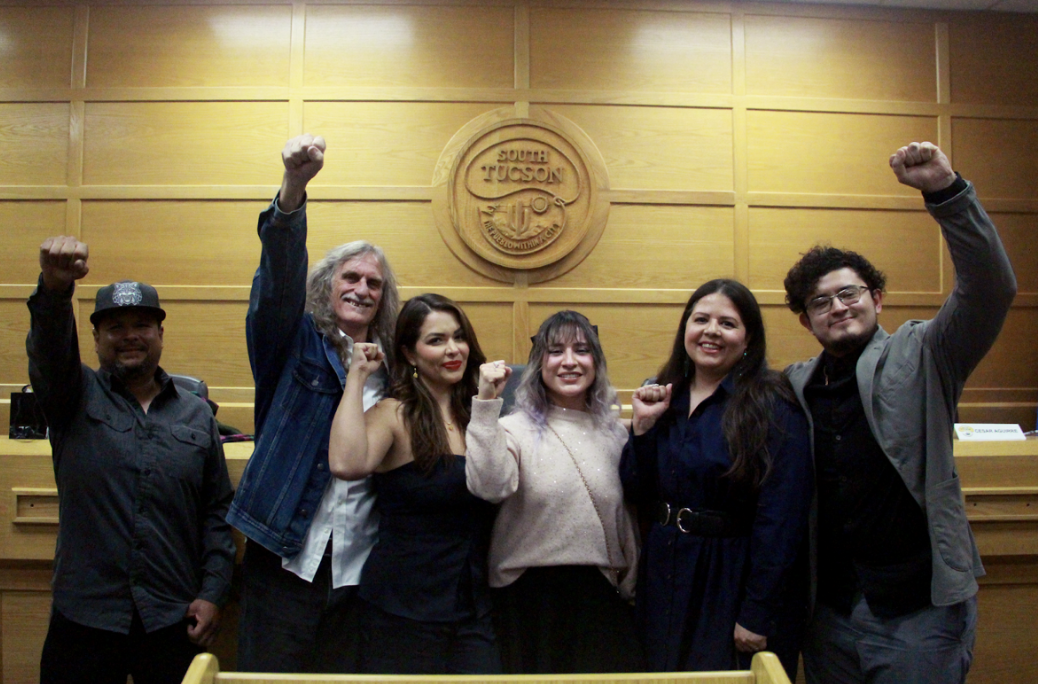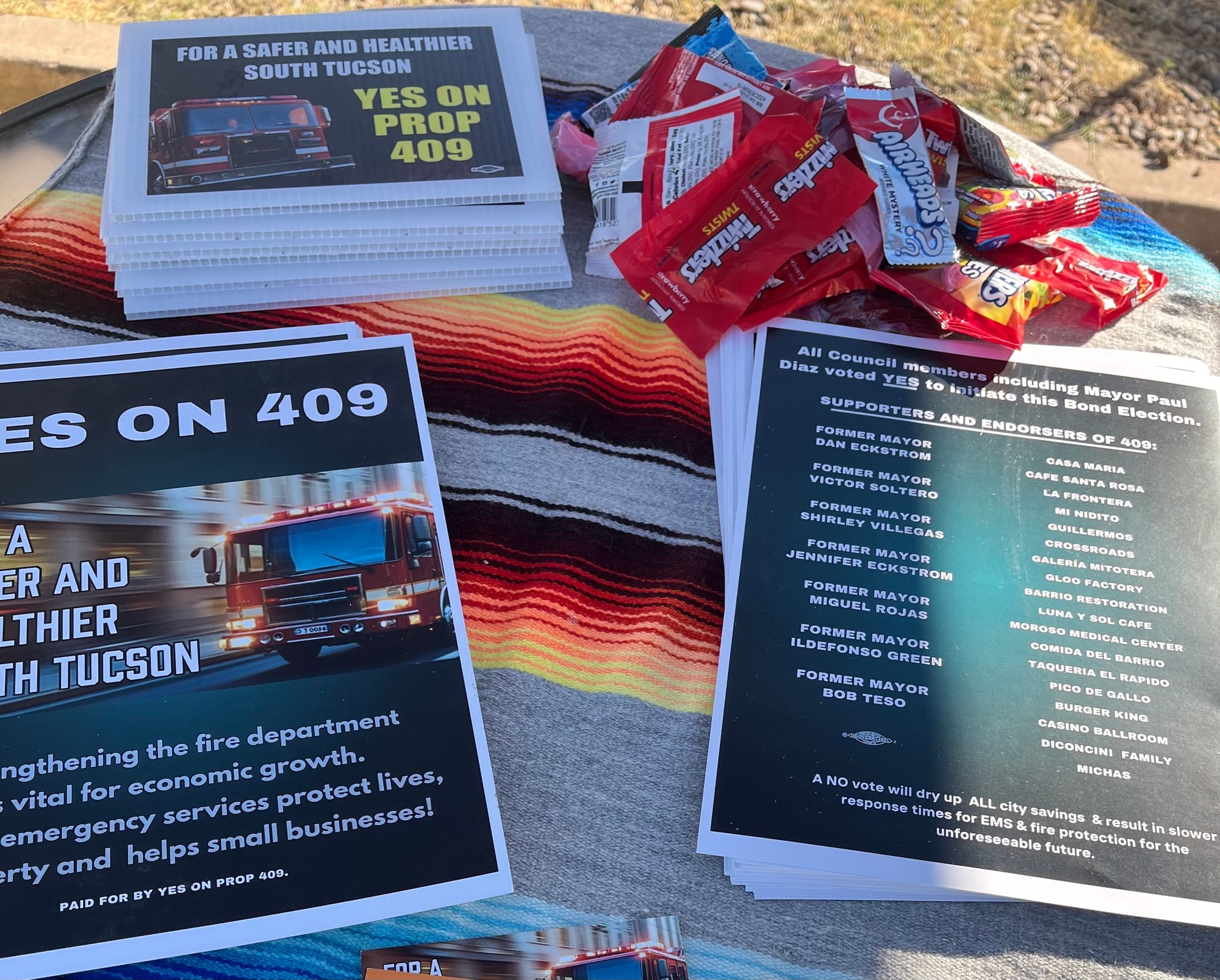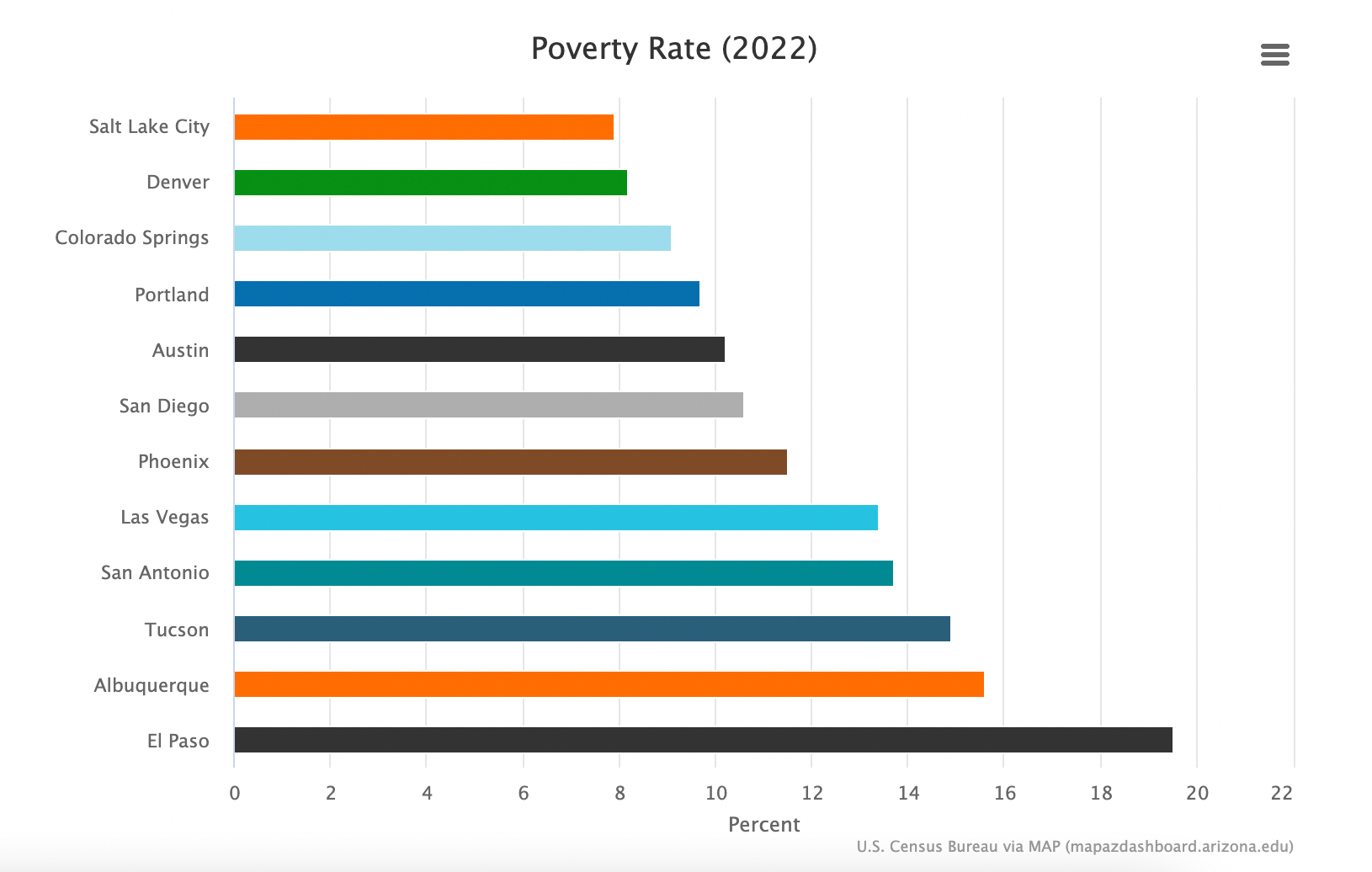An inside look at South Tucson’s new City Council
While all council members are coming in with their own priorities, they will be tasked with addressing the same issues.

It's Giving Tuesday and we're fundraising to help grow our newsroom, expand our coverage and increase our Spanish-language reporting. Please consider making a tax-deductible donation so we can continue this valuable work.
Donate to Tucson SpotlightA new leadership group is taking the helm in South Tucson today, so Tucson Spotlight decided to take a deeper look at some of the history, nuances and key issues that will shape the future of the body that governs the 1.2-square-mile city.
Incoming council members Acting Mayor Pablo Robles, Vice Mayor Melissa Brown-Dominguez and council member Dulce Jimenez are joining veteran council member and newly appointed Mayor Roxanna Valenzuela and incumbent council members Brian Flagg, Cesar Aguirre and Paul Diaz.
While all council members are coming in with their own priorities, they will be tasked with addressing the same issues.
Proposition 409
Prop 409, which was approved by voters in the November election, raised the property taxes of South Tucson residents to help fund the fire department, which has been a focal point of the council for months now.
“Prop 409 is going to set the tone for the next couple of years and the future, because that's going to provide us with the ability to enhance other services that are really needed,” Valenzuela told Tucson Spotlight.
Next steps include getting the council settled in and informed on the challenges the city has been facing when it comes to the fire department, she said. From there, her hope is to have a professional consultant perform a needs assessment so the council knows how they can go about rebuilding the fire department. After that, the council will review the situation with financial advisors.
While advisors have told the council they will have access to the Prop 409 money soon, Valenzuela says she is in no rush to start spending.
“I don't want us to act irrationally just because we have the money,” she said. “I think that South Tucson in general has always been very reactive to the problems that we face, but I want to make sure that we're strategic with this and that we are well informed.”
Former mayor and current council member Paul Diaz previously told Spotlight that he was voting against 409, alleging that the language had changed from draft to the informational voter packet that was released. Other council members have refuted these claims.

Public safety
Improvements to the fire department will go a long way to improving overall public safety in the city, Valenzuela said.
“If that department is healthy, if we're able to at least provide the bare necessities, then everybody's going to be able to thrive,” Valenzuela said.
Public safety is a top priority for many council members, including Valenzuela and Brown-Dominguez, who have advocated for safer neighborhoods and a well-funded police department.
But South Tucson pays the lowest wages in the state to its police officers, making recruiting a challenge. The police department has been seeking applications for months to fill vacant positions and reserves.
“My priorities are building partnerships and addressing public safety concerns,” said Jimenez. “I hope to work with the other council members and residents to develop a plan for the city based on our shared vision.”
She’s not the only one who thinks the success of public safety lies in collaborations with other entities.
Diaz believes that a merger between South Tucson and the Pima County Sheriff’s Department could be a solution to the lack of officers in the city.
“We cannot afford to pay our policemen the wages that are being paid around South Tucson,” Diaz said. “The liability that South Tucson has taken because (city council) refuses to do this (merge with another police department) is so critical. They refuse to do this, they go after Brian Bowers instead of fixing the city.”
Brian Bowers, landlord of two properties in South Tucson (6th Avenue Suites and Spanish Trail Apartments), was a recurring topic in the public discussion at council meetings during the year.
Many residents have attended meetings to share their experiences living on the property, which include mice and cockroach infestations, no air conditioning in the summer, illicit drug use and crime, which they say has led to various deaths on the property.
“I really do think we're going to be able to kick out the worst slumlord and get housing built in that area in South Tucson,”Flagg said
South Tucson filed a lawsuit against Bowers in January, saying he needs to do more to reduce crime and unsafe living conditions on his properties, but the lawsuit was dismissed.
Since the suit, calls for services have dropped on both properties, which have also passed inspections. But council members say the Bowers situation points to a bigger problem within South Tucson.

Housing Affordability
South Tucson’s poverty level is 51%, a stark contrast to Tucson’s 14.9%, with poverty rates serving as an indicator of financial distress among households. These rates can also help drive government decisions related to spending when it comes to programs like affordable housing and other forms of public assistance, according to the University of Arizona’s Making Action Possible study.
During the election, incumbents Valenzuela, Flagg and Aguirre campaigned together, running on a platform that prioritized affordable housing.
“We want to make it so that developers can't waltz into the city limits and transform it into something that looks like downtown Tucson and where it is really a lot of money to buy something to eat or a beer,” Flagg said. “We want to make it so that people who are real low income, who live here now, can continue to live here.”
The trio are volunteers with Casa Maria, a nonprofit whose mission is to create safe, affordable housing in South Tucson. Casa Maria also operates a soup kitchen where volunteers cook meals every day.
They also help run a community land trust through Casa Maria called Barrios Unidos Land Trust. A community land trust is a nonprofit organization governed by community members to provide lasting community assets and shared equity homeownership opportunities for families and communities.
Over 60% of housing units in South Tucson are occupied by renters, with only 39% being owner-occupied.
“It’s very important to us that we make sure that we keep the houses for everybody - not just for low income, but also for people that are on the streets that need shelter and also for people that are trying to buy property and homeownership,” Valenzuela said.
Barrios Unidos’ goal is to buy property, take it off the speculative market and keep it in the hands of the community, Valenzuela said.
So far, Casa Maria has purchased two properties in South Tucson, El Camino Hotel and the Arizona Motel, and is using it to provide affordable and transitional housing.
These moves have roused suspicion and claims by Diaz, who’s said Casa Maria does not pay property taxes, a statement Valenzuela vehemently denies.
Diaz has often been on the opposing side of the Casa Maria trio. He says affordable housing “does not exist,” and speculates about the group’s agenda. He told Spotlight his theory is that they intend to purchase properties to create Section 8 housing, so the government will pay the nonprofit to house people.
Diaz does not think it is South Tucson’s job to provide affordable housing and that people who are dealing with substandard living conditions should “just move.”
“South Tucson can only do so much,” Diaz said. “If the person said, 'They haven't fixed my heater for three weeks,’ they need to look someplace else other than South Tucson, because we cannot do it.”
Diaz said he thinks the council should focus on economic development instead, claiming that previous bad decisions have led to the economic decline of the city. He cited a big box ordinance – which was signed by Diaz himself in 2013 – that imposed more regulations on the construction of large retail establishments and shopping centers as an example of South Tucson’s failure to spur economic growth.

Division on the council
The division came to a head earlier this year, when Diaz filed a complaint against Valenzuela and demanded a recall election, alleging that she was not a resident of South Tucson when she ran for office in 2022, a violation of city ordinance and state laws.
“Roxanna Valenzuela has never lived in South Tucson until she moved into the Arizona Motel that's controlled by Casa Maria and that's the root of the recall,” Diaz told Spotlight.
Diaz shared all the evidence he collected, including his email to the Election Integrity Unit and their response saying they have referred the issue to the Criminal Division for review.
Among the documents was an election complaint form for the office of Arizona Attorney General Kris Mayes, Valenzuela’s declaration of qualification citing that she lived in South Tucson and an Arizona Corporate Commission document that states that Valenzuela is an agent for Robi, LLC, a real estate and rental leasing business listed just outside of South Tucson.
“He claims that I lived in several different places,” Valenzuela said. “I've heard different stories, different narratives from him (but) never did they do an investigation.”
Diaz is now tasked with collecting 99 signatures from eligible South Tucson voters to move the recall process along. The EIU is only responsible for enforcing statewide elections, so it will be up to South Tucson to enforce its own election laws if Diaz can garner the 99 signatures necessary.
“The mayor is to serve at the will of the council and for our last two years in an office that has not been the case,” Valenzuela said. “We have been dismissed. We have not been invited to a lot of information so it's been very difficult for us to do our job. The council has been very divided. And unfortunately, we couldn't find common ground, even though we all care for our community.”
She said she’s hopeful that this new council will help to turn a new page in South Tucson’s history and move towards collaboration.
Moving forward
While it is too early to tell how the council will move forward, all of the council members that spoke with Spotlight said they’re excited to collaborate and work towards progress.
“I know that the machine of local government is more complicated than one might think (and) I figure we'll also be challenged by folks who are fearful of change and by the wider national landscape going into our term,” Robles said. “But I know that we'll step up and protect our people and help one another to get through this, just as we have those other times.”
The new council also marks a city government that is directly involved in the community.
Valenzuela, Flagg and Aguirre fight for pathways to affordable housing through their volunteer work with Casa Maria.
Brown-Dominguez is the co-owner of Galeria Mitotera, an art gallery in South Tucson that celebrates Latinx and queer local artists of color.
And Robles, who is married to Jimenez, works with Chicanos por la Causa, a nonprofit that advocates for the needs of Latino families.
“We are here to hear, to listen. Because I feel sometimes it's hard for folks in our community to feel that they're being heard,” Brown-Dominguez said. “This is something that we have to work on collaboratively and that includes residents to be empowered and to also be involved because this isn't something none of our problems here are going to be solved just with the city government. It's going to have to be a collaboration with residents and business owners.”
Susan Barnett is Deputy Editor of Tucson Spotlight and a graduate student at the University of Arizona. She previously worked for La Estrella de Tucson. Contact her at susan@tucsonspotlight.org.
Tucson Spotlight is a community-based newsroom that provides paid opportunities for students and rising journalists in Southern Arizona. Please support our work with a paid subscription.



